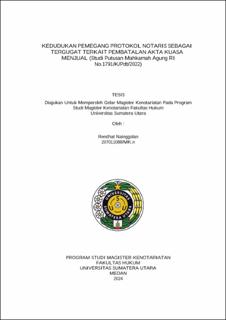| dc.description.abstract | As a protocol holder, one not only gains knowledge but also faces consequences, particularly being implicated as a defendant or being summoned if legal issues arise in the deed. The research problem concerns the misplacement of Notary protocol holders as defendants for errors in deeds made by the protocol-giving Notary. The position of Notary protocol holders as defendants regarding the annulment of a power of attorney deed in Supreme Court Decision No. 1791/K/Pd/2022 is analyzed. The legal considerations of the judges in Supreme Court Decision No. 1791/K/Pdt/2022 regarding the position of Notary protocol holders as defendants in the annulment of a power of attorney deed are examined.
The research is descriptive in nature, employing a normative legal research method. Secondary data sources are utilized, and data collection involves library research and document study. Data analysis is conducted using qualitative methods.
A protocol holder Notary cannot take any action, such as altering the contents of a deed. However, they can provide, show, or disclose the contents, authenticated copies, or excerpts of the deed to interested parties. According to Article 65 of the Notary Law, a protocol holder Notary is not liable for deeds made by a previous Notary. Nevertheless, they may be implicated as defendants if issues arise regarding the content of a deed due to additional words added to it. A protocol holder Notary does not have a formally recognized status as a party who can be sued in an effort to anmul a power of attorney deed. In such efforts, the defendant is typically the party with a vested interest or the party aggrieved by the deed, such as the grantor or other parties with interests in the deed. However, in specific cases, if there are compelling reasons, the protocol holder Notary may be involved as a defendant, based on clear and strong legal arguments within the applicable legal process. This is in accordance with prevailing regulations and contradicts notions of justice and legal certainty. | en_US |


